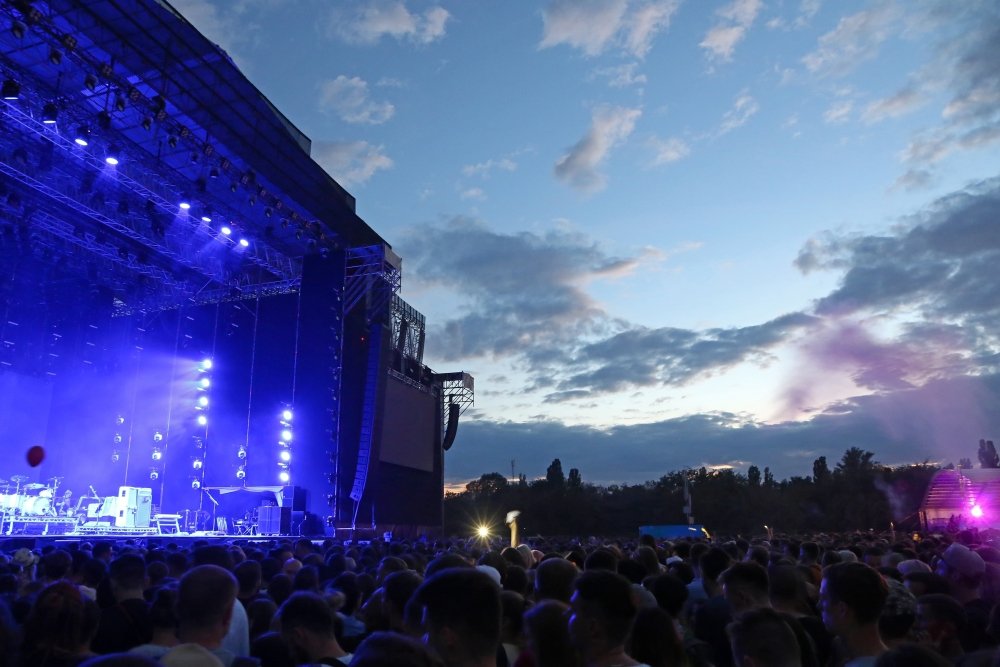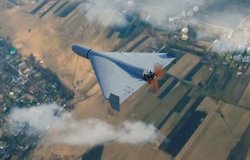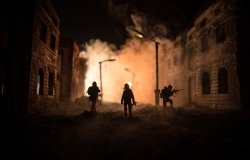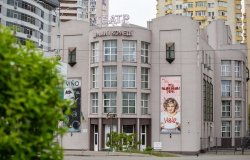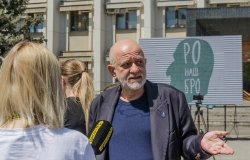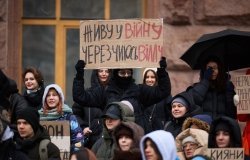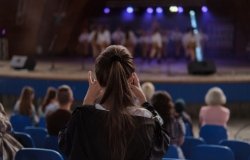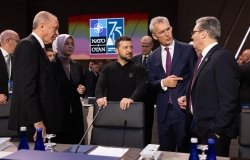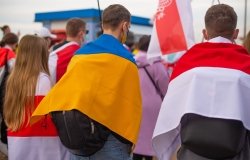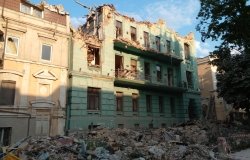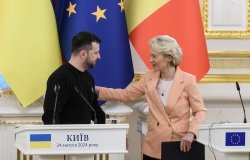
A blog of the Kennan Institute
How to Stop Living Poetry and Start Living a New Reality
Ironic rock band Smetana (Sour Cream) has brought its distinctive mix of punk, pop, and alternative rock to audiences throughout wartime Ukraine on a spring-long tour. The group, which burst out of Dnipro in 2013, has enjoyed popularity for more than a decade. Adept at leveraging social media to attract a following, Smetana’s mix of irony, commentary, and hard rock instrumentation spoke to the era’s disappointments, failed dreams, and illusions. Since the Russian full-scale invasion in 2022, it also speaks to its generation’s hopes for the future.
Singer Yehor Kuvaldin, guitarist Serhii Savockhin, bassist Oleksandr Sadunenko, and Serhiy Svergun formed the band as a joke to showcase songs which did not fit into the repertoire of their heavy metal group All Is Illusion. Shading towards more popular sounds accompanied by lighter, humorous lyrics, the new group quickly expanding its following. Smetana’s first four albums—including Worse than Last and They Don’t Need Rock—mocked trends in popular culture and music. More and more listeners embraced their parodies as speaking to the dissatisfactions of growing up in a Ukraine that seemed more of a failure than a success.
Kuvaldin and his bandmates continued to work on their metal performances which, to them, seemed more serious. In 2017, their fifth album as Smetana, Everything is Bad, broke through as its music video went viral on social media. By 2020, the group was hitting the top of several music charts even as it avoided cultivating mainstream media.
Smetana was, up until this point, a Russian-language alternative rock group enjoying social media success and attracting large audiences to its live performances. The Russian invasion of 2022 changed everything.
The band immediately supported Ukraine following the 2022 attack. It stopped singing in Russian and switched to Ukrainian, held charity concerts to support the armed forces, and released a powerful new single, “A Moment of Silence.” This effort was followed by several more singles a few months later.
Just before releasing these songs and others on an album, Kuvaldin recorded a video message for the band’s fans. He explained that he no longer wanted to release songs in Russian, even though abandoning his mother tongue was difficult personally, professionally, and artistically. As he would sing, “A third of the listeners turned into enemies / A third branded us traitors / And this means that only ours are left.” This last third turned out to form a substantial and committed fan base living through the same pressures, frustrations, and hardships of war.
The group’s next album appeared in August 2023 as its first Ukrainian-language production combining pop punk, alternative, post-punk, and hip-hop. Shortly thereafter, it released a collection of Ukrainian translations of the group’s Russian-language hits under the title Bad Vodka.
The music featured in Smetana’s recent all-Ukraine tour drew on these wartime albums (2023, 2024). Early on, the bandmates worried about their success, singing, “How to stop thinking in poetry and start living?” But war has converted their poetry into real life as their recent success reflects skill at speaking to Ukraine’s current crisis with wisdom disguised as humor.
The band came into existence a decade ago to mock the status quo of a Ukraine that seemed not to know any future. Ukraine’s future, though hardly clear now, has become far more important to the generation coming of age with Smetana. This is a time, and the band’s music is a sound, that continues to embrace sly humor even as it recognizes that the stakes placed on the table by Russian invaders have never been higher.
The opinions expressed in this article are those solely of the author and do not reflect the views of the Kennan Institute.
See our newest content first.
Subscribe to receive the latest analysis from Focus Ukraine
About the Author

Blair A. Ruble
Former Wilson Center Vice President for Programs (2014-2017); Director of the Comparative Urban Studies Program/Urban Sustainability Laboratory (1992-2017); Director of the Kennan Institute for Advanced Russian Studies (1989-2012) and Director of the Program on Global Sustainability and Resilience (2012-2014)

Kennan Institute
The Kennan Institute is the premier US center for advanced research on Eurasia and the oldest and largest regional program at the Woodrow Wilson International Center for Scholars. The Kennan Institute is committed to improving American understanding of Russia, Ukraine, Central Asia, the South Caucasus, and the surrounding region though research and exchange. Read more
